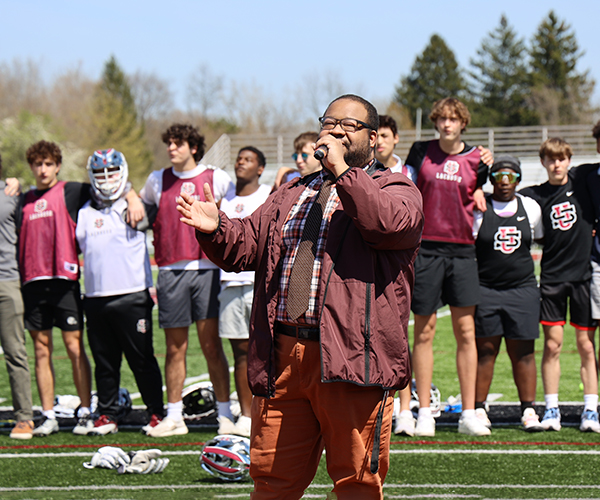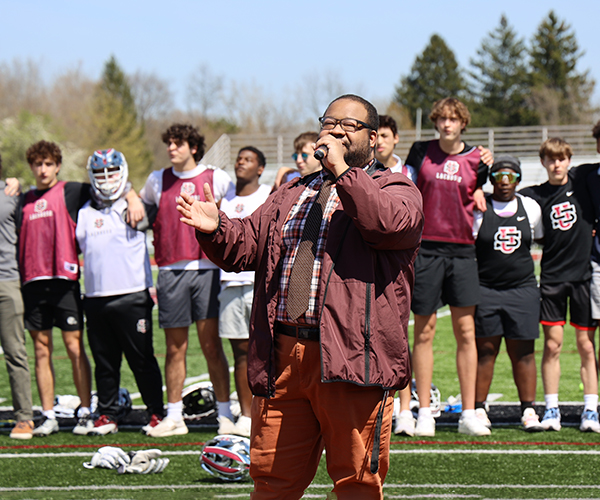During a typical day at Mountain School, Hal Juster and his classmates harvested crops, fed animals, cut firewood and explored the forest. And like other high school juniors, they had a full slate of classes and homework.
Juster, a graduate of University School and a junior at Middlebury College, attended the semester-long program back in 2013. He was encouraged to apply by his older sisters, Julia and Grace, who talked about their experiences at the rural Vershire, Vermont, farm school while he was growing up.
“I heard great things about their environmental science classes,” says Juster, who considered other semester schools as well. “I was more interested in farming than backpacking [at High Mountain Institute] or marine biology [at Island School].”
For a 16-year-old from Shaker Heights, there were also plenty of adjustments — from leaving his friends and family to accepting responsibility for chores and schoolwork to everyday life on a 300-acre working farm. But that’s also the point.
“It taught me what I could do during my first time away from home on my own,” he says. “I learned a lot about how to challenge myself.”
Indeed, a semester or year away isn’t just for college students anymore. It’s a popular choice for high school students looking for challenging new experiences, a way to distinguish themselves in the college application process or to discover who they are and what they’re passionate about.
Through the Semester Schools Network, high school sophomores, juniors or seniors can apply to one of 13 schools ranging from the Island School in the Bahamas to the School for Ethics and Global Leadership in Washington, D.C., to the Traveling School in South America and Africa.
Usually, the class sizes are small — between 35 and 60 — with tuition costs similar to a semester at an independent or boarding school. And because the schools offer advanced curriculums that combine high-level instruction in math and languages with classes specific to the school — marine ecology or public policy for example — the credits are easily transferred back to the home school.
“It was some of the most challenging classes I’ve ever taken,” says Juster.
When students return from a semester or year away, they have an entirely new perspective, says Joe Vogel, director of Hathaway Brown School’s Center for Global Citizenship. “It gives students a new window into who they are as people and what their future might be like,” he says. “It helps shape and mature students.”
* * * * *
Hathaway Brown senior Elise Fuente loved her French classes. She’d studied the language since middle school but wanted more.
So Fuente spent her junior year in a language immersion program at School Year Abroad in Rennes, France, about 200 miles from Paris. Everything but math and English were taught in French, making those early political science, art history and environmental science courses a challenge.
“The beginning was difficult, but the second semester I started being comfortable in class and with the teachers,” says Fuente.
There were other adjustments too. At Hathaway Brown, Fuente played field hockey, but that wasn’t available in France. Instead, she used the time abroad to take a photo class and participate in Model United Nations, a competition that allows students to learn about diplomacy and international relations. Fuente also volunteered with the Franco-American Institute, which provides U.S. cultural activities in Rennes.
Fuente spent each semester with a different host family — one that was very similar to her life back home and one that wasn’t. “I learned that everybody does things a little differently,” she says. “And that’s OK.”
These changes can be tough for teens. Parents should consider whether their child is mature enough to take on more independence. “People underestimate cultural differences and the different rhythms of life,” says Matthew Redman, vice president of global high school and teach abroad programs for the Council on International Educational Exchange. It helps facilitate these programs for more than 30,000 students every year.
Many schools offer information fairs in the fall and guidance to help parents determine what might best fit with their child’s interests and maturity.
For Fuente, School Year Abroad was a significant support system. Her parents were in regular contact with the school rector and host family. And with today’s technology, it was easy for Fuente to keep in touch with friends and talk with her mom every day.
Still, that separation can be just as rough for parents as it is for the student. “It’s being able to let go and understand the student is going to grow and become more independent and confident, which are qualities parents are generally seeking,” says Redman.
During her year in Rennes, Fuente left her comfort zone by learning to navigate the city, take public transportation and travel across the country visiting historic churches, monuments and museums in Marseille, Paris, Loire Valley, Normandy, Brittany and Nantes. While in Rennes, she enjoyed going to the open-air market every weekend.
“I’m a lot emotionally stronger and more self-aware, and a lot less stressed,” she says. “Being away put things in perspective that things will work out, even if it’s not the way I planned.”
* * * * *
Laurel School senior Deirdre O’Malley wanted to attend Mountain School to spend more time in nature and connect with how working on a farm relates to science.
But the small-class setting offered by many of the semester schools has benefits no matter what the area of study.
At Mountain School, students help maintain the crops and animals. They contribute to cooking meals, learn from a maple sugaring operation and explore the wilderness. Chores rotate weekly among the 45 students, giving them multiple skill sets. “You could be picking corn, weeding broccoli, harvesting wheat or moving animals around with one of the farmers,” says O’Malley.
For Juster, balancing his schoolwork and his role on the farm was a valuable lesson in time management. “I learned a lot about interacting with peers and taking shared ownership of a space,” Juster says. “It gives you a sense of responsibility knowing your efforts are really significant.”
A highlight of the semester for both Juster and O’Malley was the weekend camping trip. After learning how to survive in the wilderness, individuals spend four days and three nights alone in the nearby forest.
Both also agree that studying, farming, eating and living for an entire semester with their classmates and instructors was a unique experience. “I’ve never gotten to such a personal level with my mentors,” says O’Malley. “That was really cool.”
She considered her Mountain School classmates “44 of my best friends.”
The intensity of those experiences, however, can sometimes make for a rocky transition back home. Reconnecting with social groups and home life can be a challenge after such an immersive and engaging period.
While he easily assimilated back into his friend group, Juster says, it was a struggle going from spending almost 24/7 with 44 students to being just one of 400 classmates at University School.
“I was feeling less significant in that larger community,” he says. “It took me a while to get back to a comfortable place.”
Not getting hung up on comparing the two experiences and working toward what he now says is his new ideal was helpful.
Redman suggests students consider three to five ways to represent their time away to different audiences so they feel listened to and validated. It’s a major life experience, he says, so parents also need to be realistic and understanding during the transition.
“Parents need to provide space for students to feel those emotions about not fitting in or people not understanding the experience,” says Redman.
For many students, the benefits far outweigh any short-term bumps. During her four-day solo trip in the woods, O’Malley figured out what she wanted to do in college. “I wasn’t really sure what I wanted to do with myself before I went,” she says. “I was sitting in a hammock in the woods and thinking, I need to be outdoors researching and hiking, not sitting at a desk.”
She has Darmouth College, Colby College in Maine and Skidmore College in New York on her early list and plans to pursue a career in environmental science.
“Colleges look at that and see a student who is self-aware and takes advantage of opportunities,” says Nicole Lawrence, University School’s director of community and international partnerships.
Even if her college plans don’t work out as she hopes, O’Malley has something else to fall back on from Mountain School.
“I’m able to cut myself some slack,” she says. “Even though the courses at Mountain School were rigorous, I realize there are other things that are important in life.”




